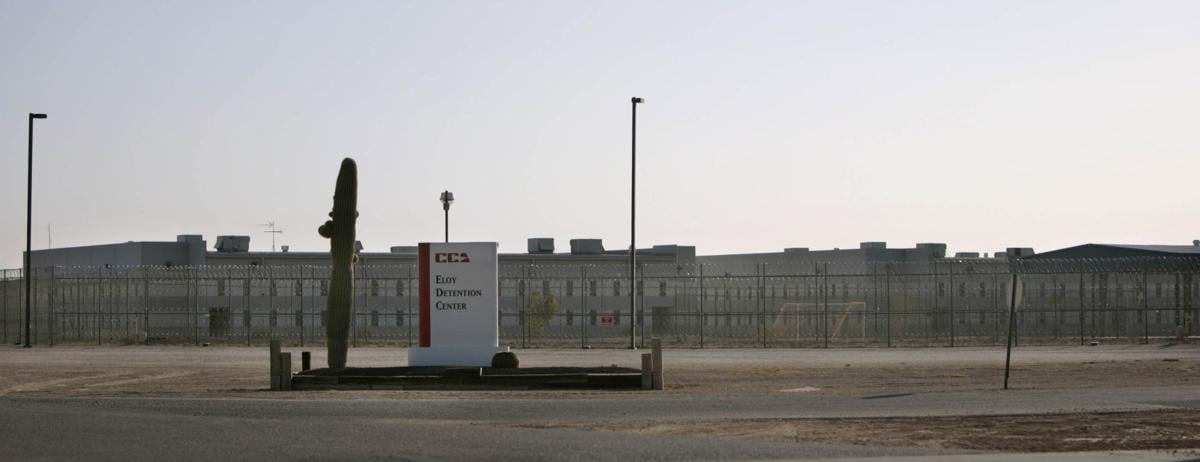Migrant advocates are calling for an investigation of conditions at immigration detention facilities during the coronavirus pandemic.
Advocates have called for the release of immigrant detainees since the pandemic began, but those calls now have renewed urgency after a man in custody of Immigration and Customs Enforcement in San Diego died Wednesday from COVID-19.
No deaths were reported among ICE detainees in Arizona, but the number of confirmed coronavirus cases in Arizona rose to 62 since the first case was reported April 1, according to ICE statistics. Nationwide, 788 detainees tested positive for the coronavirus since the first case on March 24 in New Jersey.
On Wednesday, Carlos Ernesto Escobar Mejia, a 57-year-old man from El Salvador held by ICE in San Diego, died after spending a week hospitalized for COVID-19, the San Diego Union Tribune reported.
He was the first confirmed ICE detainee to die of COVID-19
The next day, a coalition of immigration advocates asked the Department of Homeland Security’s Office for Civil Rights and Civil Liberties and DHS’ Office of the Inspector General to “investigate the lack of protective measures being taken to stem the further spread of COVID-19” among ICE detainees.
“We submit this complaint in the midst of an aggressive global pandemic that thrives in exactly the close-quarter settings found in ICE detention facilities, where social distancing is largely impossible,” according to the complaint.
At the Eloy Detention Center, an asylum seeker from Michoacan, Mexico identified in the complaint by the pseudonym “Melisa” said she has been in custody since November and fears for her health.
“There’s no reason why I should remain here during this pandemic and become another person at risk that’s also putting at risk other people, and creating more work for the workers of ICE,” Melisa wrote in a declaration.
“I fear that I will get sick at the detention center since they have a hard time keeping us at the correct distance and perhaps do not have the resources to supply all of us with masks and gloves,” Melisa wrote.
Before being sent to the detention center, Melisa said she waited for months at the border until she and her family spoke to immigration officials at a port of entry. She has eight family members in Northern California, including five who are U.S. citizens and two who, like her, are asking for asylum.
Her family owned a ranch in Mexico and they had a “very economically comfortable life,” she wrote.
They fled after two of her brothers were tortured by members of an organized crime group that wanted to take over their ranch and force the family to work with them.
“But we decided to stay honest and not collaborate with criminals,” she wrote. “For that reason, we had to leave our country and our lives. If I could be in Mexico, I would be there.”
She was given a cloth mask for the first time on April 21, which she washes herself, she wrote. She buys soap, but many other detainees cannot afford to buy soap to supplement the soap provided by CoreCivic, the private prison company that runs the facility. She also washes her own bed sheets and clothes “because the clothes never come back clean from the laundromat.”
An ICE employee at the Eloy Detention Center tested positive for the coronavirus, as did an ICE employee at the Florence Detention Center, according to ICE. As of Friday afternoon, ICE reported 10 coronavirus cases among detainees at the Florence Detention Center and 52 cases at the La Palma Correctional Facility in Eloy.
The complaint also included testimonials from detainees in New Mexico, Texas, Louisiana, Georgia, and California.
The public affairs office for ICE in Arizona referred questions to the national office, which did not respond to an inquiry from the Star. ICE policy is to follow guidelines from the Centers for Disease Control and Prevention. That includes isolating the infected person and others who may have been infected. Social visits were suspended.
ICE released about 900 detainees who were elderly, pregnant or otherwise medically vulnerable. Both ICE and Customs and Border Protection have sent fewer people to detention centers in recent weeks. Nationwide, CBP sent about 2,900 people to ICE custody in April, down from about 11,200 in February.
ICE’s enforcement actions sent about 5,600 to custody in April, down from about 11,500 in February.
In Arizona, the most recent statistics provided by ICE show 2,981 detainees as of April 11. ICE was holding about 28,900 detainees across the country as of May 2, down from about 32,300 on April 11.
The May 7 complaint filed by 10 advocacy groups, including the Immigration Justice Campaign, the American Friends Service Committee, and the Southern Poverty Law Center, also asked ICE to release detainees, provide more hygiene supplies and personal protective equipment, increase coronavirus testing, and stop transferring detainees among facilities.
A lawyer whose name was redacted from the complaint wrote that some employees at the reception and visitation areas in Eloy’s La Palma were working without protective gear when the lawyer visited a client on April 16.
At the same time, an employee of CoreCivic said lawyers must wear masks, gloves and protective glasses. CoreCivic staff took the lawyer’s temperature and asked a series of health-related questions, the lawyer wrote.
The lawyer saw hand sanitizer at two locations in the visitation area. The lawyer’s client did not wear a mask or gloves, nor did other detainees in the waiting room, the lawyer wrote.
On April 24, the lawyer saw an employee in the lobby who was not wearing a mask or gloves. In the visitation area, two employees wore cloth masks. A group of detainees wore paper masks. The lawyer’s client wore a paper mask.





